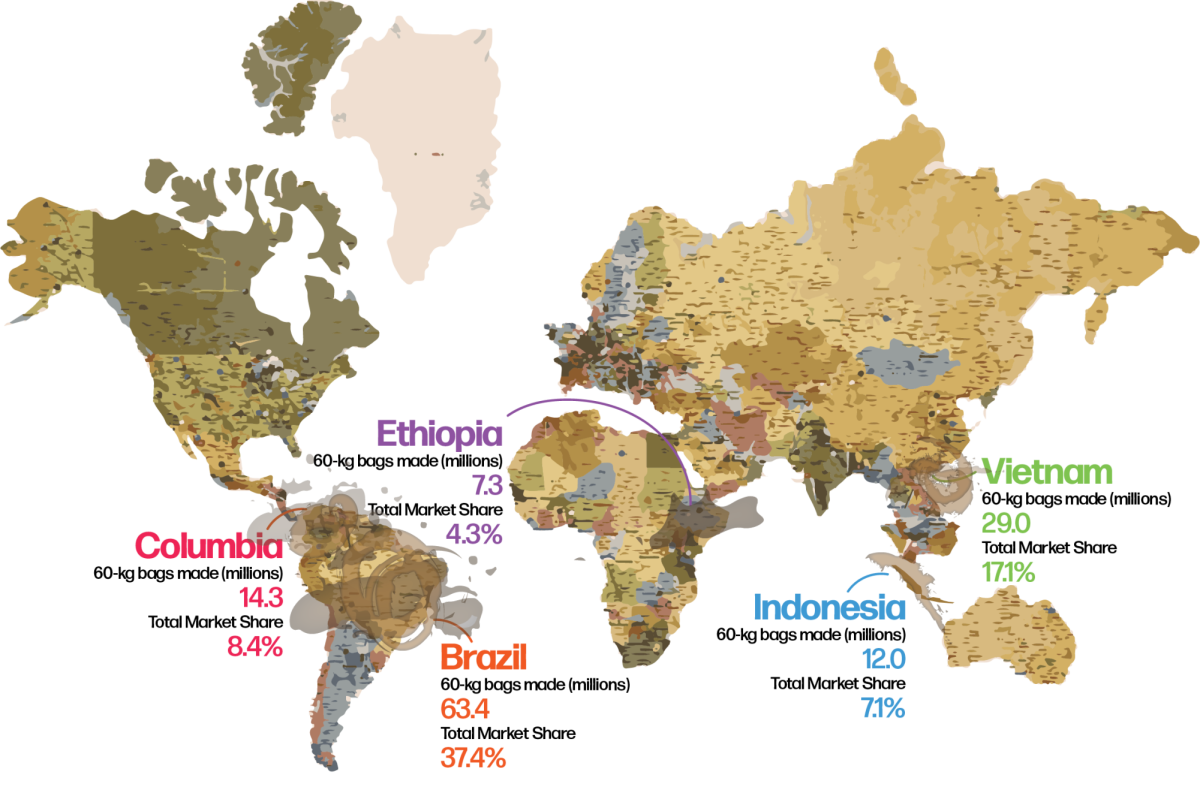Rising temperatures, water scarcity, habitat loss and increased frequency of natural disasters causing the displacement of populations all come to mind when discussing climate change. But not many people understand how climate change will affect their daily coffee. The region suitable for growing coffee, known as the “coffee belt,” will shrink by 50% by 2050 and no longer be fruitful due to rising temperatures, according to the Inter-American Development Bank, the largest source of development financing for Latin America and the Caribbean.
According to Verywell Health, approximately 80% of the global population ingests caffeinated products daily and 73% of adolescents in the United States. Junior Stella McElveen shares her love of coffee with that 73%.
“I drink [coffee] most mornings and sometimes in the afternoon as well,” McElveen said.
A January survey conducted by Statista Consumer Insights reports that 80% of daily coffee drinkers in the United States consumed two or more cups of coffee in the comfort of their homes during the week. Suffice it to say there are very few individuals worldwide who would not be affected if coffee production was significantly reduced and prices increased.
Alongside the global population of coffee drinkers, the farms that are responsible for producing this crop will be impacted. Biology teacher Bryan Moretz predicts climate change will alter the water and carbon cycles, altering current farming techniques. This may also lead to a shifted market for large coffee chains.
“Farming is reliant on stable systems,” Moretz said. “We’re seeing farmers not able to grow crops effectively or having to change their farming practices, [which] in turn leads to them losing money and not being able to produce as much food for people.”
The disastrous outcomes of climate change can already be felt worldwide, both directly and indirectly.
“We are currently seeing countries suffering from…droughts and severe climate change and the overall effect it’s having on poorer people,” Moretz said.
The impact of global warming on coffee production and farming echoes future troubles with food security. According to Moretz, the crops most affected by global warming include rice, corn and wheat–all of which are included in the carbohydrates Americans eat daily. Water management must improve to safeguard against food insecurity for future generations.
“Americans tend to think water doesn’t have much value, but in reality, it’s one of the most precious resources we have,” Moretz said. “We need to do better with managing our water… and other resources more carefully, and make sure we take care of what we have.”
Without cognizance about climate change in its entirety, there is a sense of detachment and inaction, both of which will continue to negatively impact global food security.
“[The climate] is going in a downward spiral because there aren’t many people making efforts to restore it,” McElveen said. “After a while, it will be much harder to access certain foods.”
Starbucks has already acted to breed climate-resistant varieties of Arabica coffee, the only coffee species they use. According to CNN, the company aims to develop an assortment of plants that mimic Arabica coffee’s distinctive smell and taste while being hardier than other coffee species, including Coffee robusta and Coffea liberica.
Climate change is delivered right to the dinner tables and daily routines of coffee drinkers, and with it, a message of what could be lost if nothing is done to slow its progression.
“Whether people want to admit it or not, [climate change] affects all of us in some way, shape or form,” Moretz said. “…We might not notice it today, but 10 or 15 years down the road, [there] will be a major impact on how we grocery shop or enjoy our environment.”





